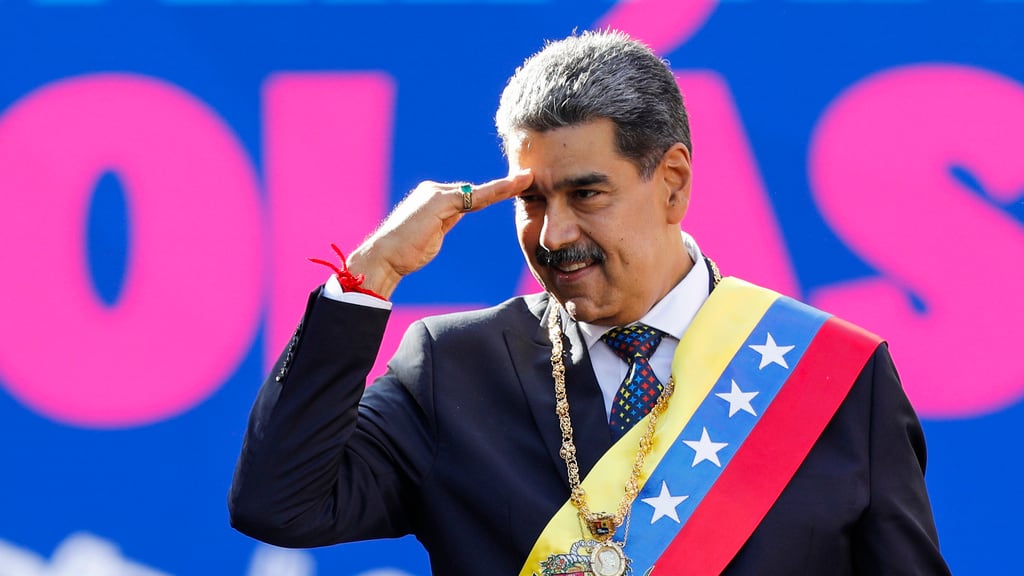The Venezuelan president, Nicolás Maduro, made statements this weekend in which he proposed that the independence of Puerto Rico as a territory of the United States should be sought and to confront the “colonization agenda of the north.”
The words of the Venezuelan president were spoken during the closing of the International Antifascist World Festival in the South American country, where people attended carrying flags from different nations, including Puerto Rico.
PUBLICIDAD
What did Nicolás Maduro say about Puerto Rico?
Maduro asked the people holding the flags of Puerto Rico and Cuba to come up on stage, and then requested the song "De un pájaro las dos alas" by singer and composer Pablo Milanés to be played.
"Just as the North has a colonization plan, we have a liberation plan that was bequeathed to us by Simón Bolívar. The independence of Puerto Rico is still pending and we will achieve it, with the forces of Brazil and Abreu e Lima leading the way. The Abreu e Lima Battalion will be responsible for liberating Puerto Rico. What do you think?", declared the Venezuelan president.
Among the attendees, there were also individuals carrying the flag of Brazil, which led the president to include the South American country in his proposal to free Puerto Rico.
The mention of José Inácio de Abreu e Lima is because he was a Brazilian general who fought alongside Simón Bolívar.
During the same event, the president who assumed a new term also warned that, if necessary and in case his government is threatened, he will resort to arms.
The president stated that "Venezuela is getting ready along with Cuba, along with Nicaragua, along with our older brothers in the world, so if one day we have to take up arms to defend the right to peace, the right to sovereignty, and the historical rights of our homeland."
The event brought together approximately 2,000 delegates from 125 nations and took place following the inauguration of the Venezuelan president after controversial elections and in a context of opposition protests due to the electoral results from the previous year.
Venezuelan opposition struggles between hope and disappointment
The inauguration of Nicolás Maduro as president of Venezuela caused a range of mixed emotions among his detractors on Saturday, including hopes and disappointments. They wondered why it was not possible to stop the self-proclaimed socialist leader, despite the existence of convincing evidence indicating that he had lost the elections the previous year to Edmundo González.
Some mentioned that their mood after the events on Friday at the Legislative Palace in Caracas was similar to an emotional hangover, while others expressed feeling abandoned.
Countries like Costa Rica, Panama, Ecuador, and the Dominican Republic classified Maduro's inauguration on Saturday as an "illegitimate act," the result of "electoral fraud imposed through state terror" on Venezuelans, they stated in a joint statement. They assured that their efforts will continue until achieving "a democratic transition" in Venezuela.
The opposition leader, María Corina Machado, said in a message on social media on Friday that Maduro was guilty of a coup by not leaving office on January 10, the date when, by law, the presidential term of Venezuela begins. She also stated that she was sure that the "freedom of the country is near" but did not mention the next steps the opposition could take to end Maduro's presidency.
Highlighting Maduro's increasing isolation, the United States, Canada, the United Kingdom, and the European Union announced on Friday new sanctions against more than 20 Venezuelan officials, accusing them of undermining democracy in the country. Among those targeted were Supreme Court judges, electoral authorities, the head of the state oil company, and ministers.
On the other hand, Maduro awarded the Bicentennial Order to those sanctioned by those countries on Saturday. During a public event, he also stated that "nobody in Venezuela wants a coup, nobody wants military intervention," in response to the previous request made by former Colombian president, Álvaro Uribe, who called for "international intervention" to remove the regime and hold "free elections" in that country.
The Bolivarian Armed Forces of Venezuela reacted shortly before, in a statement, ensuring that there is an attempt to tarnish the “historic moment” of Maduro’s presidency until 2031.
